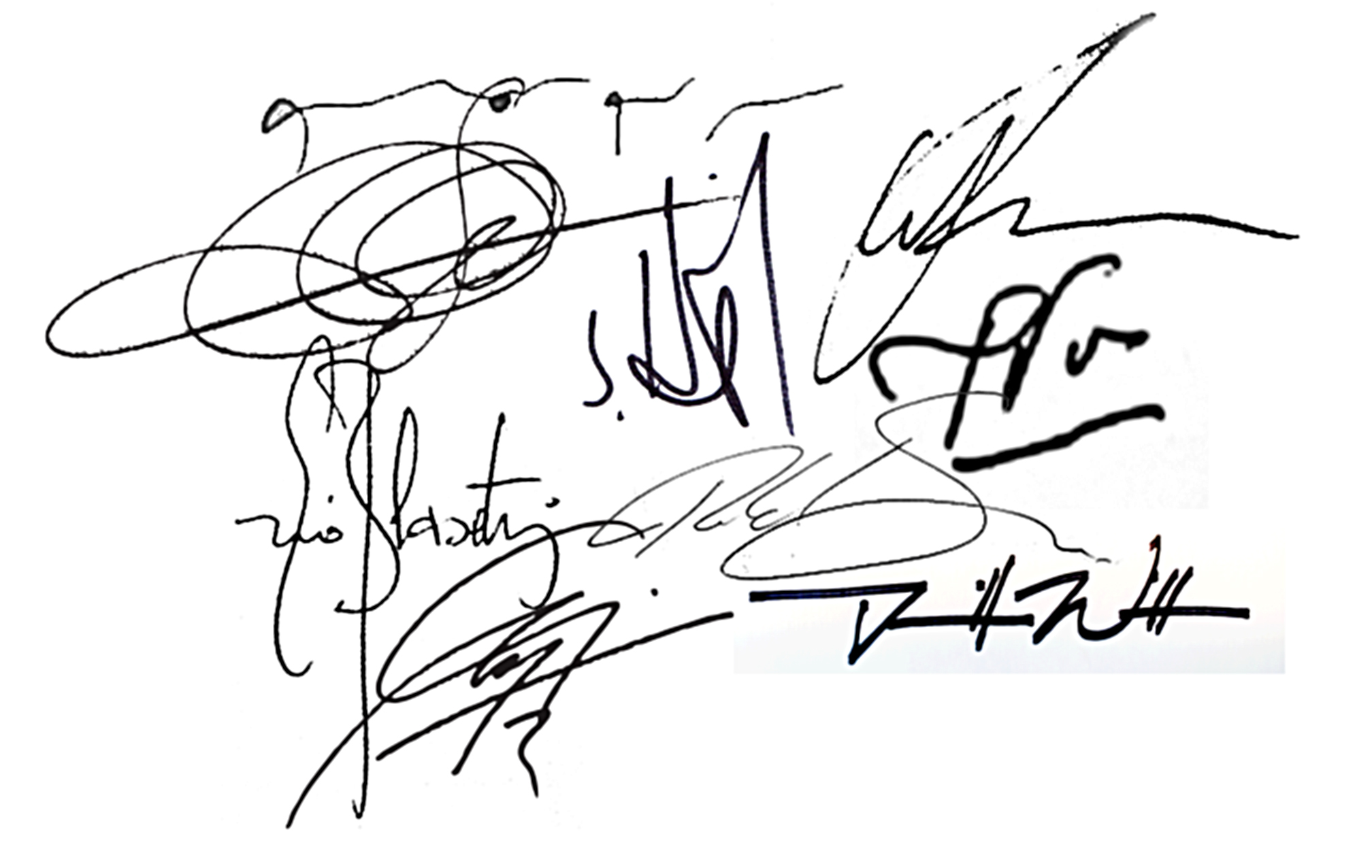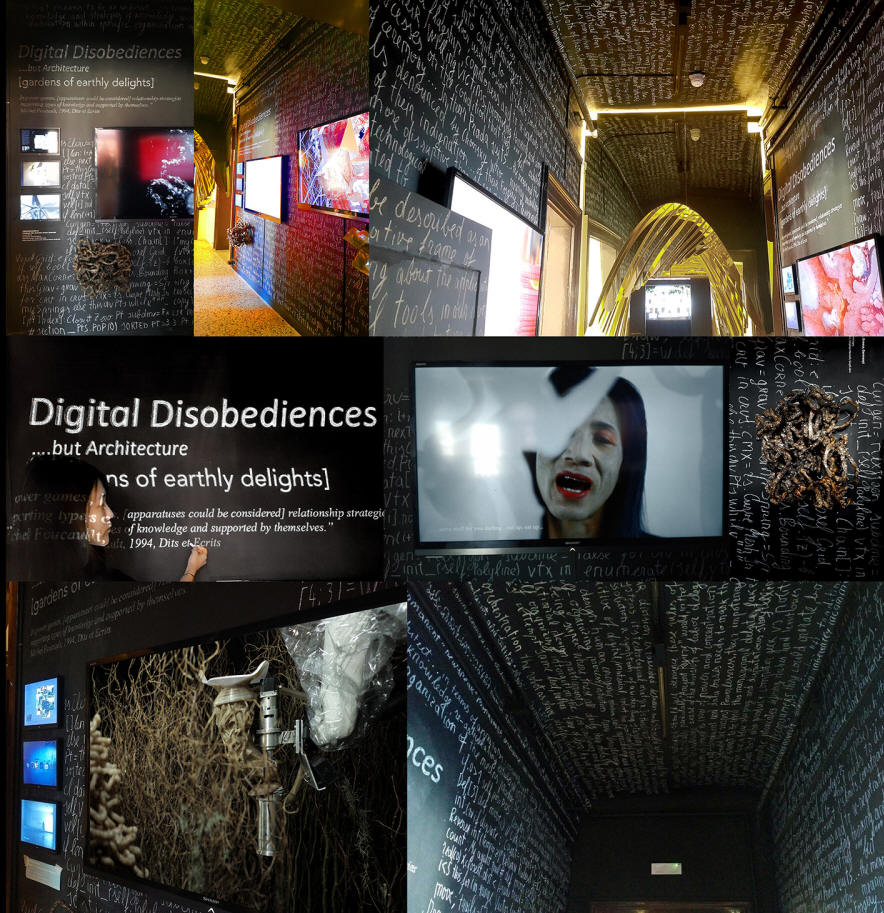
#digitaldisobediences
….but Architecture
[gardens of earthly delights]
In power games, [apparatuses could be considered] relationship strategies supporting types of knowledge and supported by themselves.” Michel Foucault, 1994, Dits et Ecrits)
We can’t remain satisfied with protest. This historically operative way to challenge the organization of power is now naïve, childish, self-complacent and unproductive.
Should we suspect that digital “art” is meant to be used as a glamorous lure, a blue sleeping pill, to entertain those who produce it, just as turpentine intoxicates the painter, and, for its consumers, to help maintain their belief in the illusion of positivism, progress, emancipation through science and novelty gadgets… Trapped in a post-science world without even knowing it, one already described by Rabelais in the middle of the Quattrocento…
Should we suspect the apparent direct opposites of these Mephistopheleses, the regressive moralists and semiologists who turn their indignation into capital to recoup their 30 pieces of silver, using correct consciousness as a flagship, commoners and common goods as their willing victims, promoting “bottom-up” processes on the condition that they be the masters of ceremony… in their Prada suits… the intellectuals denounced by Chomsky who safeguard the system, its means, meaning and authority,… but nevertheless claim, by virtue of their indignation, the magnificence of their position… of their forgery…
Should we reveal that these two paradigms are simply the Janus faces of the same system… in a symmetrical convergence of interests and benefits? Could we develop a paradigm other than the interplay between the cynic and the clown?
Should we denounce our academic standing as a wasp-like trialophile position of expertise, operating and reproducing the new disciplinary vogue for our daily three obols, the standard rate for courtesans and heliasts at the time of Cleon? Are we trapped in false debates between hereditary abstractions and social formalism, or even, the counterpart of all this, trapped in the empty speeches of gala socialism? Has the empathic penitence of our silence rendered null and void the articulation of our experimentation? Should we denounce the Melian nymphs’ pride and foolishness and subject them to their weak suffering? Should we suspect that, in the amnesty’s aftermath, we will have to pay the fine in exile, drink the conium, or even accept being forgotten in our escapist digital swan song?
How to embody the performative polymorphism and inheritance of our techno-social economies and language, to vectoralize the fiction of identity egotism towards new sortitions of assemblies, at a time when the similitude of appearances is dismissed as “filer à l'anglaise”? at a time of Computationalism, when space is quantized with subjectivities? Should we suspect that our own graft is, in fact, the suspect, suggest another game, one we could lose… “Try to remember. It was in the gardens at Marienbad.…”
These rules of predictable “ANCIENT REGIM” world, in the sense of the division of labor, delegation of power and concentration of data bases, needs to mask their powerlessness, their impotency, through this managerial debate, fake conflict and disputatious storytelling / the computer geek vs. the political clown… defining niches and territories from where they could operate, both of them spreading ‘’the traditional and compliant speech of the masters.’’
We are in the midst of a paradigm shift, to quote Thomas Kuhn, between two inherently incommensurable systems. The old system that uses technology to reproduce and perpetuate top-down processes (which they falsely claim to oppose)…. and a new system that needs to discover its potential, its limits, constraints, intrinsic logic… to re-negotiate the scenario of thinking and doing… “””but””” architecture… the means and the meaning, rearticulating “le vivre ensemble” and the “common good”… for protocols more disruptive than linear, more heuristic than deterministic, more anthropo-technological (Sloterdijk) than purely dedicated to accuracy, performativity, expertise, now analyzed as one symptom of the copy-based syndrome…
Digital Disobedience can be described as an alternative frame of thinking about the application of novel tools in our contemporary discourse. Architecture as a discipline is on the verge of a decisive moment: automation and artificial intelligence will bring more change to the entire practice than even the revolutionary introduction of computational tools did in the last quarter of a century. This brings along an entire set of questions, which Digital Disobedience attempts to ask. The answer is not the main issue here, rather the set of opportunities presented in the critical interrogation of our current, and future relationships to novel ecologies emerging in society, economy and technology. How will we, as architects, respond to this rapidly progressing change? Is being docile, in expectance of the best a sufficient position to maintain? The collective of architects on display here refuse to be usurped by a neoliberalist position on computational design and architecture and rather support an idea that fosters a speculative approach to the future. A position that embraces change triggered by technological progress in the methods of materializing architectural entities. A future in which robots and human form novel modes of machines infused with aspects of morality and inquisitive intelligence. A post-capitalist future that embraces the radical change in our social texture triggered by the possibilities of a world governed by deterritorialized entities in which we expand, repurpose or accelerate aspect of our culture and technology for the benefit of our world at large.
How is one to digitally disobey? Would the ultimate disobedience be to automate design, to automate intuition? While the profession would decry the idea of automating intuition anathema, to a laymans eye such intuition has already been automated. Turing-complete neural networks are able to intuitively (a justifiable term as even their programmers do not fully understand the logic of their working) synthesise everything from Monet to Shakespeare, creative works that would be impossible to describe with conventional programming. To a philistine, Van Gogh might appear to have been automated. ArchFakely proves poor architectural writing has been automated in a literary project that has no aspiration to be read, as no-one reads the text of the data-set on which it is modelled anyway. As cultural content is generated faster than we could ever consume it, and content that does make it to an audience is consumed instantly, do we really find pause to absorb its meaning? Is digital disobedience this acceleration? The the skimming of latent-space in order to shift from “computational design” to the “computational derive” through a snowcrash of endless difference? Have machines already learned to model the tastes and desires that might guide this meander? Is digital disobedience a reluctance to be spoonfed? A resistance to the state of the art? After forgetting how to code and critically engage with the machines that generate their visual culture, will architects forget their own canon? Will fake histories emerge, channeling popularly held belief and melting what was once thought to be immutable historical fact into a toxifying generative adversarial goo?
This is a shift from imposing our will/intention on, or within, the systems of computation, to embracing the dissolution of the binary distinction of the intuitive and systemic. While computational design seeks to embed intuition into the self-organizing algorithms of complexity theory, this is being superseded by the emergence of a computational intuition – ‘what kind of subjectivity the heuristic bits dreams ?’ Rather than computational architecture’s attempt to shift from invention to pseudo-orchestration, this shift/glitch questions the subjective/objective division established between architect its technological matrix. Is this a symptom of a wider blurring of digital/material, robot/human, emergence/intuition, process/artefact, where these participants all interact on the same plane, rather than considering the robot as either the slave of savior, or vice versa?
‘’Libidinal Economy’’ of J.f. Lyotard as well as ‘’Capitalism and Schizophrenia’’ of Deleuze-Guattari, as the ‘’#ACCELERATE MANIFESTO for an Accelerationist Politics’’ of Alex Williams and Nick Srnicek, as well as ‘the specter is still roaming around’, one of the first book of Zizek, are describing the hiatus, the hypo_crisis situation of lefties, drinking red wine at the e-flux carnival, during the performative election of oval room populism… As actor of the world of today, in the zeitgeist of absurdism and cutting edges daily announcement of new gadgets, new saving energy, new electric car, new Viagra, new climate threads and ignorances, using sciences, paradoxically, as a new obscurantism…….in post-human, post-queers, post-dummies…for permanent ‘’newspeak” propaganda… what means to be an architect…in terms of apparatus, knowledge and strategies of knowledge, re-articulating fabrication within specific organization of the ‘’means of production’’ which re-question the know-how, the will and the process, in another distribution of task-power, authorship, bottom-up strategies, in term of trespassing “the true and the fake, the rigor and madness, and… the forbidden(1)”.
Did somebody say time break!

Bangkok, New-York, Melbourne, Athens, Stuttgart, March 2018
Francois Roche (New-Territories), Ezio Blasetti - Danielle Willems (MÆTA DESIGN), Matias Del Campo - Sandra Manninger (SPAN), Roland Snooks . Benoit Durandin . Stephan Henrich . Gwyll Jahn (ide.ai)…

---------------------------------
Few words /
-Socio Parade Moralism Vs Workerism
-Oedipal Haptic Vs Blind Machines
-Symbiosis Vs AutoPoesis
-Heuristic Vs Linear
-Disobedience Vs Compliance
-Artifact Vs Determinism
-Disruptive Vs Causal
-Psychotic Vs Compliance
-Singularities Vs ‘’deja vu’
-'Pataphysic Vs AI
-Anomalies Vs By-product
-Necrosis Vs Permanence
-Ecosophy Vs Ecology
-Artifacts Vs Expertise
-Paradigms Vs Paradigms
-Paranoia Critic Vs Voluntary Servitude
-Profane Vs Institutional
-Gafa Big Data Vs Democratic Social Contract
-Digital_Analogue Vs Digital_ Fetishism
-----------------
1) Michel Foucault ‘’the Order of Discourse’’ / 1971
-------------